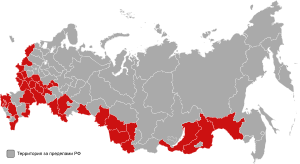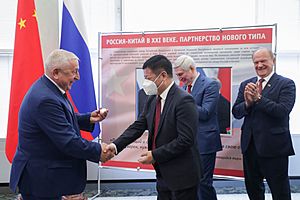Gennady Zyuganov facts for kids
Quick facts for kids
Gennady Zyuganov
MP
|
|
|---|---|
| Геннадий Зюганов | |
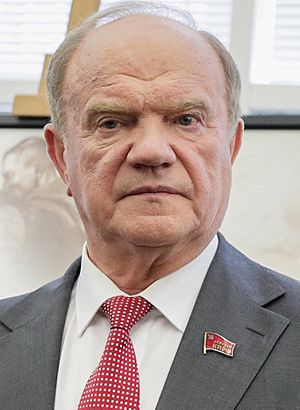
Zyuganov in 2022
|
|
| Chair of the Union of Communist Parties | |
| Assumed office 22 January 2001 |
|
| Preceded by | Oleg Shenin |
| General Secretary of the Communist Party of the Russian Federation | |
| Assumed office 14 February 1993 |
|
| Preceded by | Valentin Kuptsov |
| Parliamentary Leader of the Communist Party of the Russian Federation in the State Duma | |
| Assumed office 13 January 1994 |
|
| Preceded by | Position established |
| Member of the State Duma (Party List Seat) | |
| Assumed office 11 January 1994 |
|
| Personal details | |
| Born | 26 June 1944 Mymrino, RSFSR, USSR |
| Political party | |
| Spouse | Nadezhda Vitalyevna |
| Children |
|
| Relatives | Leonid Zyuganov (grandson) |
| Education |
|
| Awards | |
| Signature | |
| Military service | |
| Allegiance | |
| Branch/service | Soviet Army |
| Years of service | 1963–1966 |
| Rank | Colonel |
Gennady Andreyevich Zyuganov (Russian: Генна́дий Андре́евич Зюга́нов; born 26 June 1944) is a Russian politician who has been the General Secretary of the Communist Party of the Russian Federation and served as Member of the State Duma since 1993. He is also the Chair of the Union of Communist Parties – Communist Party of the Soviet Union (UCP-CPSU) since 2001. Zyuganov ran for President of Russia four times, most controversially in 1996, when he lost in the second round to Boris Yeltsin.
Contents
Early life and education
Zyuganov was born in Mymrino, a farming village in Oryol Oblast, on 26 June 1944. The son and grandson of schoolteachers, he followed in their footsteps. His father fought at the Soviet-German front of WWII and returned home with serious injuries. After graduating from a secondary school, his first job was working there for one year as a physics teacher in 1961.
In 1962, Gennady enrolled into the Department of Physics and Mathematics of the Oryol Pedagogical Institute. From 1963 to 1966, he served in a Radiation, Chemical, and Biological Intelligence unit of the Group of Soviet Forces in Germany. Zyuganov joined the Communist Party in 1966.
He returned to the teachers' college in 1966. Three years older than most members of his class, he was already a party member and a popular college athlete. On his return, he married his wife, Nadezhda. He completed his degree in 1969.
CPSU career
Zyuganov taught mathematics but soon turned to Communist Party of the Soviet Union work in Oryol Oblast, beginning in 1967. He became the First Secretary of the local Komsomol and the regional chief for ideology and propaganda. He emerged as a popular politician in the area. Among many other functions, Zyuganov organized parties and dances as a local Komsomol leader while he was rising through the ranks of the party. Zyuganov rose to be second secretary, or second in command, of the party in Oryol.
He enrolled at an elite party school in Moscow, the Academy of Social Sciences in 1978, completing his doctor nauk, a post-doctoral degree, in 1980. He then returned to Oryol to become regional party chief for ideology and propaganda until 1983. In 1983, he was given a high-level position in Moscow as an instructor in the Communist Party propaganda department.
Zyuganov emerged as a leading critic of Soviet leader Mikhail Gorbachev's perestroika and glasnost in the party's Agitation and Propaganda division (later the Ideological division), a hotbed of opposition to reform. As the party began to crumble in the late 1980s, Zyuganov took the side of hard-liners against reforms that would ultimately culminate in the end of CPSU rule and the dissolution of the Soviet Union. In May 1991, he published a fiercely critical piece on Alexander Yakovlev.
Head of the Communist Party of the Russian Federation
Zyuganov wrote several influential papers in the early 1990s attacking Boris Yeltsin and calling for a return to the socialism of the pre-Gorbachev days. In July 1991, he signed the "A Word to the People" declaration. As the Communist Party of the Soviet Union fell into disarray, Zyuganov helped form the new Communist Party of the Russian Federation (CPRF), and became one of seven secretaries of the new group's Central Committee. In 1993, he became its chairman. Outside observers were surprised by the survival of Zyuganov's Communist Party into the post-Soviet era.
Zyuganov emerged as post-communist Russia's leading opposition leader. He argued that the collapse of the Soviet Union led to a decline in living standards, that economic power was left concentrated in the hands of a tiny share of the population, that violent crime increased, and that the Soviet collapse allowed ethnic groups throughout Russia to embark on campaigns, sometimes violent, to win autonomy.
Russians who felt left behind in the new Russia emerged as Zyuganov's supporters, including a number of workers, clerks, bureaucrats, professionals, and the elderly. As Zyuganov succeeded in combining Communist ideas with Russian nationalism, his new Communist Party of the Russian Federation joined hands with numerous other left-wing and right-wing nationalist forces, forming a common "national-patriotic alliance."
In the 1993 and 1995 parliamentary elections, the newly revitalized Communist Party of the Russian Federation made a strong showing, and Zyuganov emerged as a serious challenger to President Yeltsin.
1996 presidential campaign
Zyuganov entered the 1996 presidential election, as the standard-bearer of the Russian Communist Party. Co-opting Russian nationalism, he attacked the infiltration of Western ideals into Russian society and portrayed Russia as a great nation that had been dismantled from within by traitors in cahoots with Western capitalists, who sought the dissolution of Soviet power to exploit Russia's boundless resources.
Hungarian-American billionaire George Soros, along with Russian oligarchs such as Boris Berezovsky, Vladimir Gusinsky, Mikhail Khodorkovsky, Anatoly Chubais, and others feared a Communist resurgence in Russia while witnessing Zyuganov present himself as a kinder, gentler Communist while attending the World Economic Forum at Davos in 1996. Chubais recalled, stating "I saw many of my good friends, presidents of major American companies, European companies, who were simply dancing around Zyuganov, trying to catch his eye, peering at him. These were the world's most powerful businessmen, with world famous names, who with their entire appearance demonstrated that they were seeking support of the future president of Russia, because it was clear to everyone that Zyuganov was going to be the future president of Russia, and now they needed to build a relationship with him. So, this shook me up!".
The oligarchs set aside their differences and held several private meetings in Davos hotel rooms, where they strategized how to defeat the perceived Zyuganov threat. The result was the "Davos pact", an agreement between Chubais and the oligarchs that he would lead an anti-Communist campaign against Zyuganov, that they agreed to fund. The subsequent months saw a massive media offensive as "money poured into advertising campaigns, into regional tours, into bribing journalists", all supported by the oligarchs who owned the major media. Yeltsin's subsequent victory in that election can be traced back to the events that took place in Davos between Chubais and those Russian oligarchs.
In the election on 16 June, Zyuganov finished second with 32%, trailing only Yeltsin, who captured 35%. Zyuganov prepared for the 3 July runoff election with confidence. He ran a campaign focusing on the president's ill health and pledged to return Russia to its Soviet days of glory. Yeltsin, however, relentlessly exploited his advantages of incumbency, patronage, and financial backing. Yeltsin gained from the elimination of the many smaller parties, as well as the support of Alexander Lebed, and eventually won the two-man showdown by 53.8% against 40.7%.
It has been alleged that Yeltsin may not have legitimately won the 1996 presidential election, but instead employed electoral fraud. Some results, largely from Russia's ethnic republics of Tatarstan, Dagestan and Bashkortostan, showed highly unlikely changes in voting patterns between the two rounds of voting. At a meeting with opposition leaders in 2012, then-president Dmitry Medvedev was reported to have said, "There is hardly any doubt who won [that race]. It was not Boris Nikolaevich Yeltsin."
After 1996 election
Political observers suggested that Zyuganov was still a force to be reckoned with in Russian politics, and that his next task would be to remake the communists into a strong opposition. But after the December 1999 parliamentary elections, the number of Communist seats in the Duma was reduced. Communist support started to decline, given the widespread electoral support at the time for the government's invasion of Chechnya in September 1999 and the popularity of Yeltsin's new prime minister, Vladimir Putin, who was widely seen as the ailing Yeltsin's heir apparent.
2000 presidential campaign
Zyuganov placed a distant second behind Vladimir Putin in the March 2000 presidential election.
After 2000 election
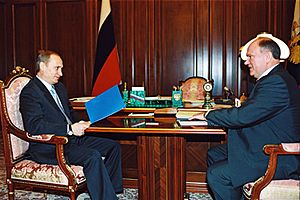
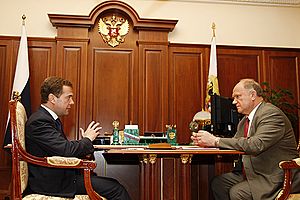
Zyuganov has additionally served as the Chairman of the Union of Communist Parties – Communist Party of the Soviet Union (UCP-CPSU) since 2001, replacing Oleg Shenin.
In November 2001, in an open letter to Putin ahead of the summit between the US and Russian presidents in the United States, Zyuganov said that Russia was betraying its national interests. "It is blindly following US policy which has been characterized recently by open aggression". Zyuganov criticized Putin for his decision the previous month to close a Cuban listening post that eavesdropped on US communications and a key naval base in Vietnam, as well as Russian support for Washington using bases in former Soviet Uzbekistan and Tajikistan for its Afghan strikes. "Russia's national state and national interests may be betrayed" at the upcoming summit between Putin and US President George W. Bush, Zyuganov warned.
In 2004, Zyuganov declined to run against Putin, who secured a landslide reelection victory.
2008 presidential campaign
In October 2005, Zyuganov indicated that he would run for president in 2008, making him the second person to enter the race for the Kremlin following former Prime Minister Mikhail Kasyanov. According to one report, Zyuganov pledged to quadruple pensions and state salaries, should he be elected.
In the presidential election on 2 March 2008, Zyuganov garnered 17.76% of the vote and came in second to Medvedev's 70.23%.
Post-2008
On Zyuganov's 65th birthday in June 2009, the then Prime Minister Vladimir Putin presented him with a copy of the first Soviet edition of the Communist Manifesto. On the occasion of Soviet leader Joseph Stalin's birthday on 21 December 2010, Zyuganov called for the re-Stalinization of Russian society in an open letter to President Medvedev.
After Putin's annual address to parliament on 20 April 2011, Zyuganov criticised it as inadequate in dealing with Russia's economic decline and warned that, "If the [parliamentary and presidential] elections are as dirty as before, the situation will develop along the North African scenario." Zyuganov denounced election irregularities in the Russian legislative election of 2011 but also expressed his opposition to the organizers of the mass demonstrations of December 2011 who he viewed as liberals who exploited unrest.
The communist party played only a minor role in the protests, with one of its speakers, who called for restoration of Soviet power, being booed off the stage. Party rallies on 18 December 2011, in protest of election irregularities in Moscow and St. Petersburg were attended by only a few thousand, mostly elderly, party supporters. According to The New York Times, it is questionable that Zyuganov, due to his age and association with Soviet policies, will be able to capitalize on the opportunity presented by popular disgust with the Putin regime, or mobilize mass popular support for his party.
Zyuganov is a harsh critic of President Vladimir Putin, but states that his recipes for Russia's future are true to his Soviet roots. Zyuganov hopes to renationalise all major industries and he believes the USSR was "the most humane state in human history".
The CPRF cherishes the rule of Joseph Stalin.
2012 presidential campaign
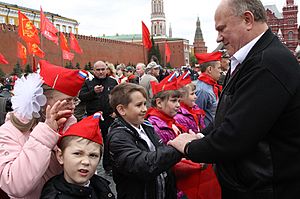
In September 2011, Zyuganov again became the CPRF's candidate for the 2012 presidential election. According to Zyuganov, "a gang of folks who cannot do anything in life apart from dollars, profits and mumbling, has humiliated the country" and called for a new international alliance to "counter the aggressive policies of imperialist circles."
In the 2012 Russian presidential election on 4 March 2012, Zyuganov once again came in second place by receiving 17% of the vote.
Political views
According to Zyuganov, Jesus Christ was the first communist, claiming the Bible may be read through a socialist perspective.
He is considered by Russian scholars as a neo-Eurasianist.
In August 2022, Zyuganov said that reformist Soviet leader Mikhail Gorbachev was a leader whose rule brought "absolute sadness, misfortune and problems [for] all the peoples of our country".
In February 2022, Zyuganov was placed on the sanctions list by the United States, Canada, Japan, United Kingdom, Australia and the European Union.
Personal life
His wife, Nadezhda Zyuganova (née Amelicheva) graduated from History Department of Oryol Pedagogical Institute. They have two children: Andrey (1968) and Tatyana (1974). They have seven grandsons and one granddaughter.
Sanctions
In February 2022, Zyuganov, who voted for the 2022 Russian invasion of Ukraine, was placed on the sanctions list by the United States, Canada, Japan, United Kingdom, Australia and the European Union.
Electoral history
See also
 In Spanish: Guennadi Ziugánov para niños
In Spanish: Guennadi Ziugánov para niños
- Architect amidst the Ruins
- A Word to the People


